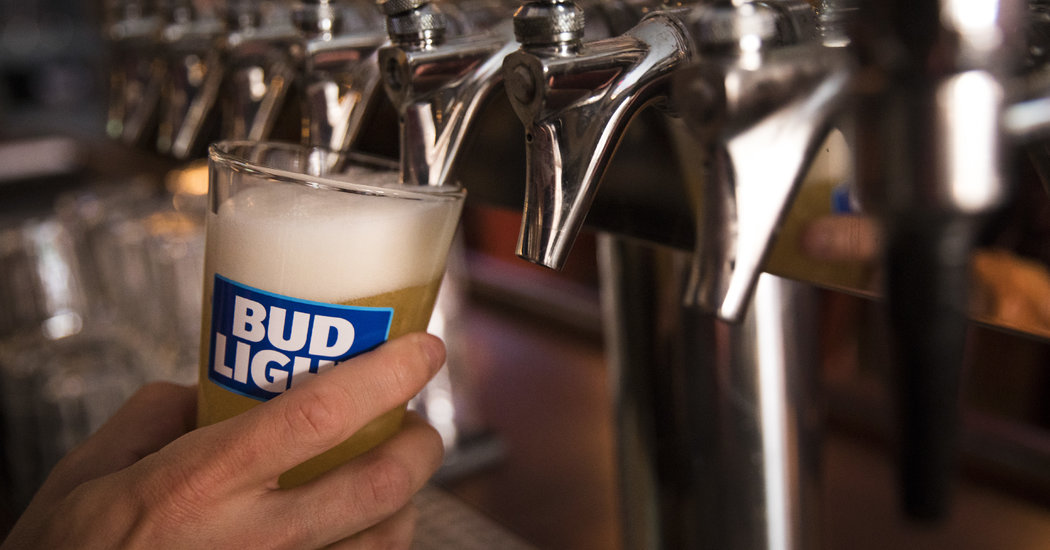
Bud Light made an enemy of the corn industry on Sunday by boasting in a Super Bowl ad that, unlike its fiercest competitors, it does not brew its beer with corn syrup.
While corn lobbyists responded in anger, and competing brands fought back, some viewers were left to wonder: Does it matter if corn syrup is used during fermentation?
“The bottom line is that the claims regarding corn syrup in brewing are more marketing than science,” said David Ludwig, a professor of nutrition at the Harvard T. H. Chan School of Public Health.
Beer is made by fermenting sugar. During the fermentation process, yeast converts the sugar into alcohol.
“Corn syrup is a form of sugar that’s been produced from a grain,” Dr. Ludwig said. “Whether that sugar is produced by first milling and then enzymatically treating the grain, or doing so from corn in a separate process, isn’t going to matter much to the final nutritional quality.”
Bud Light’s ad came days after it became the first major beer to start listing its ingredients on its label. It lists just four — water, barley, rice and hops.
In response to the ad, Kevin Ross, a vice president of the National Corn Growers Association, shared a video of himself pouring Bud Light down the drain.
“Bud Light, if you’re not standing with corn farmers, we’re not standing with you,” he said.
The corn lobbying group, which says it represents 40,000 dues-paying farmers among an industry of 300,000, said in a tweet aimed at Bud Light that “America’s corn farmers are disappointed in you.” The tweet was shared thousands of times.
If you’re concerned about the nutritional value of your beer — and none of it is particularly healthy — there’s no need to focus on the sugars used during fermentation. You can just look at the label: The main considerations are the alcohol content and the final carbohydrate content.
If a beer company were to add corn syrup to the finished product, after the fermentation process, it would potentially be cause for concern, Dr. Ludwig said.
Sugary beverages and too many processed carbohydrates are a “major problem with the food supply,” he said, and they promote weight gain while also increasing the risk of diabetes and cardiovascular disease.
High-fructose corn syrup, a sweeter variant that is commonly added to processed food and beverages, has often been linked to obesity. Health professionals tend to suggest that there is little evidence high-fructose corn syrup is less healthy than other artificial sweeteners, but that most people would benefit by cutting down on it along with all other forms of sugar. (Corn syrup is made entirely of glucose, while both high-fructose corn syrup and white sugar contain glucose and fructose.)
While Bud Light sought to portray corn syrup as a nutritional boogeyman, several beverages produced by its parent company, Anheuser-Busch InBev, use corn syrup, including Bud Ice, Natural Ice and Rolling Rock, according to the company’s nutritional data.
MillerCoors, which makes Miller Lite and Coors Light, volleyed back on Twitter, shifting the focus from corn syrup to high-fructose corn syrup. It wrote that it was “proud that none of our products include any high fructose corn syrup, while a number of Anheuser-Busch products do.”
The company was correct: While many MillerCoors beers use corn syrup, none contain high-fructose corn syrup, according to its published nutritional data. Some AB InBev brands, including Bud Light Lime-A-Rita, include high-fructose corn syrup.
The back-and-forth spat may not have been the best result for Bud Light, said Wendy Clark, chief executive of the advertising agency DDB Worldwide.
“I don’t know if anyone watching the Super Bowl necessarily cares about corn syrup, and it kicked up much ado about nothing,” Ms. Clark said.
“It’s taken off into this corn syrup thing and not a Bud Light thing,” she added, “and I don’t know if that was the goal.”
In a statement, Anheuser Busch said it “fully supports corn growers and will continue to invest in the corn industry.
“Bud Light’s Super Bowl commercials are only meant to point out a key difference in Bud Light from some other light beers,” it continued. “This effort is to provide consumers transparency and elevate the beer category.”
High-fructose corn syrup was introduced in the 1970s as a cheaper alternative to sugar, and it was rapidly adopted as a key ingredient in sodas and other high-calorie foods. The corn industry has pushed back against studies suggesting it is more harmful than sugar, spending tens of millions of dollars in lobbying to influence public opinion.
The United States Food and Drug Administration says it is “not aware of any evidence” that there’s a health difference between high-fructose corn syrup and other sweeteners like sucrose or honey. A Harvard publication and the American Heart Association came to similar conclusions.
“If you’re concerned about your health, the smart play is to cut back on added sugar, regardless of the type,” according to the Mayo Clinic.

